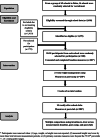Testing a multicomponent lifestyle intervention for combatting childhood obesity
- PMID: 33926412
- PMCID: PMC8082655
- DOI: 10.1186/s12889-021-10838-1
Testing a multicomponent lifestyle intervention for combatting childhood obesity
Abstract
Background: Childhood obesity is a major global health concern. Weight-management camps involving delivery of a program of physical activity, health education, and healthy eating are an effective treatment, although post-intervention weight-management is less well understood. Our objective was to assess the effectiveness of a weight-management camp followed by a community intervention in supporting weight-management for overweight children and children with obesity.
Methods: Participants were overweight Qatari schoolchildren or schoolchildren with obesity, ages 8-14 years, (n = 300) recruited over a three-year period across 14 randomly selected schools in the Doha area. They attended a two-week weight management camp, then a 10-week program of weekly lifestyle education and physical activity sessions, which also included behavior change techniques. The programme was cognitive behavioural therapy (CBT)-focused with a strong element of behavioural economics blended in.
Results: Participants saw a significant BMI SDS reduction as a result of the entire intervention (camp + education and activity sessions) both at the individual (p < 0.0001) and cluster/school (p = 0.0002) levels, and weight loss occurred during each intervention stage separately for the camp (p < 0.0001 for both the individual and cluster/school levels) and the lifestyle education and activity phase (p < 0.0001 and p = 0.0220 at the individual and cluster/school levels, respectively).
Conclusions: Weekly lifestyle education and activity sessions which include behavior change techniques may be useful in promoting continued weight management in the period following intensive, immersive childhood obesity interventions.
Trial registration: ClinicalTrials.gov NCT02972164 , November 23, 2016.
Keywords: Behaviour change; Childhood obesity; Community health; Intervention; Weight management program.
Conflict of interest statement
Professor Paul Gately is a Professor at Leeds Beckett University as well as being the Managing Director and a shareholder of MoreLife UK Ltd. MoreLife UK Ltd. is an organisation that delivers weight management and health improvement programmes in the UK, it is a subsidiary company of Leeds Beckett University. The remaining authors declare no conflict of interest.
Figures




References
-
- Kostas K, Alexandra S, Kyriaki K. Childhood obesity and its associations with morbidity and mortality in adult life. Diabetes Compl. 2018;2(4):1–12. doi: 10.33425/2639-9326.1039. - DOI
Publication types
MeSH terms
Associated data
Grants and funding
LinkOut - more resources
Full Text Sources
Other Literature Sources
Medical

